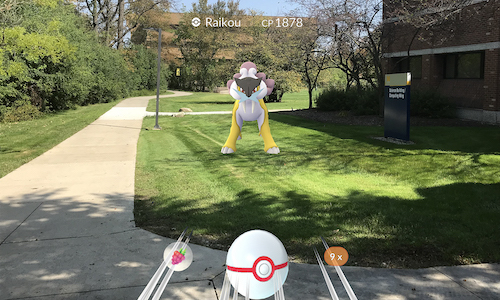
Pokémon Go players want to catch ’em all.
And so does the business world—but in that case, it’s the audiences’ attention they are after.
Among the first published research studies on the augmented reality game application, Marketing Assistant Professor Philipp Rauschnabel said he and his co-authors researched consumer attitudes, intentions and purchasing behavior.
Using the camera from a cell phone, Pokémon Go brings colorful creatures to neighborhoods, parks, businesses, schools and more, Players walk around to find and “collect” them.
Rauschnabel—who is co-chairing the 2018 International Augmented and Virtual Reality Conference—said he isn’t necessarily a “gamer,” but he wanted to discover the reason for the success behind the most popular AR game to date.
“Augmented reality is a trending topic in marketing,” he said. “So whether is was a game or a simulation experience that gained mainstream appeal, it’s important to look at the reasons why and the results of the appeal.”
Conducting a questionnaire survey of 600 Pokémon Go users starting in summer of 2016—when the game launched—Rauschnabel and his colleagues Alexander Rossmann from Germany and M. Claudia tom Dieck from England said participants shared some expected answers on why they played: nostalgia for the 1990s-created characters, physical activity, having an immersive experience and enjoyment from playing.
But others were a bit surprising and may affect how businesses measure financial success when it comes to in-app purchases.
“Common sense would argue that people who like playing Pokémon Go more are also more likely to spend money on in-app purchases. But results indicate that this is not the case,” said Rauschnabel, noting that Pokémon Go is a free-to-play game where users either earn items and accomplishments through long-term game play or bypass earning the accomplishments by paying for them.
“People who liked it continued to play and achieve. It was the people who played because it was popular and for status—and not for the enjoyment—who paid to keep up.”
He said that finding is important because it indicates that user evaluations of a game might not be a good indicator for financial performance.
“Popularity will help drive up the status and that may have a financial impact, but in-app purchases and user evaluations of the game are independent from each other,” he said. “So if people want a free-to-play game to generate income, simply having it liked isn’t enough.”
Other findings in the gamified research include:
- Pokémon Go consumers, who had data collected and shared and had their locations tracked, weren’t concerned about data privacy.
- Although there are physical risks to screen distraction while walking in public, consumers are only marginally concerned about this.
- Even though consumers play in groups, research showed that socializing isn’t a gratification factor and wasn’t relevant in why people play.
Rauschnabel’s complete research article, “An Adoption Framework for Mobile Augmented Reality Games: The Case of Pokémon Go,” is available on the Computers in Human Behavior website.





